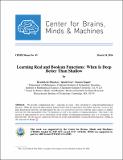Learning Real and Boolean Functions: When Is Deep Better Than Shallow
Author(s)
Mhaskar, Hrushikesh; Liao, Qianli; Poggio, Tomaso
DownloadCBMM-Memo-045.pdf (634.3Kb)
Terms of use
Metadata
Show full item recordAbstract
We describe computational tasks - especially in vision - that correspond to compositional/hierarchical functions. While the universal approximation property holds both for hierarchical and shallow networks, we prove that deep (hierarchical) networks can approximate the class of compositional functions with the same accuracy as shallow networks but with exponentially lower VC-dimension as well as the number of training parameters. This leads to the question of approximation by sparse polynomials (in the number of independent parameters) and, as a consequence, by deep networks. We also discuss connections between our results and learnability of sparse Boolean functions, settling an old conjecture by Bengio.
Date issued
2016-03-08Publisher
Center for Brains, Minds and Machines (CBMM), arXiv
Citation
arXiv:1603.00988
Series/Report no.
CBMM Memo Series;045
Keywords
computational tasks, Computer vision, Hierarchy
Collections
The following license files are associated with this item: